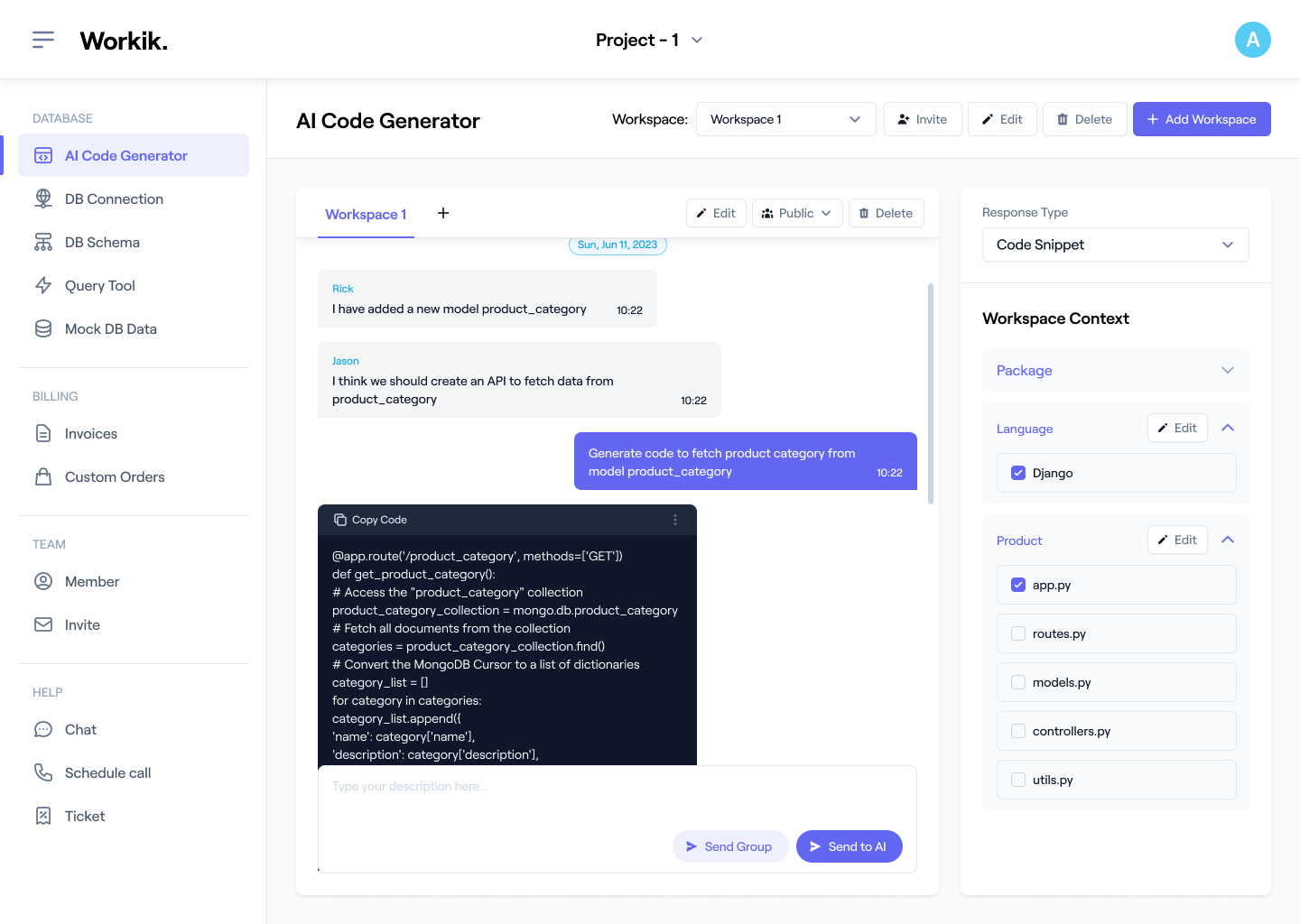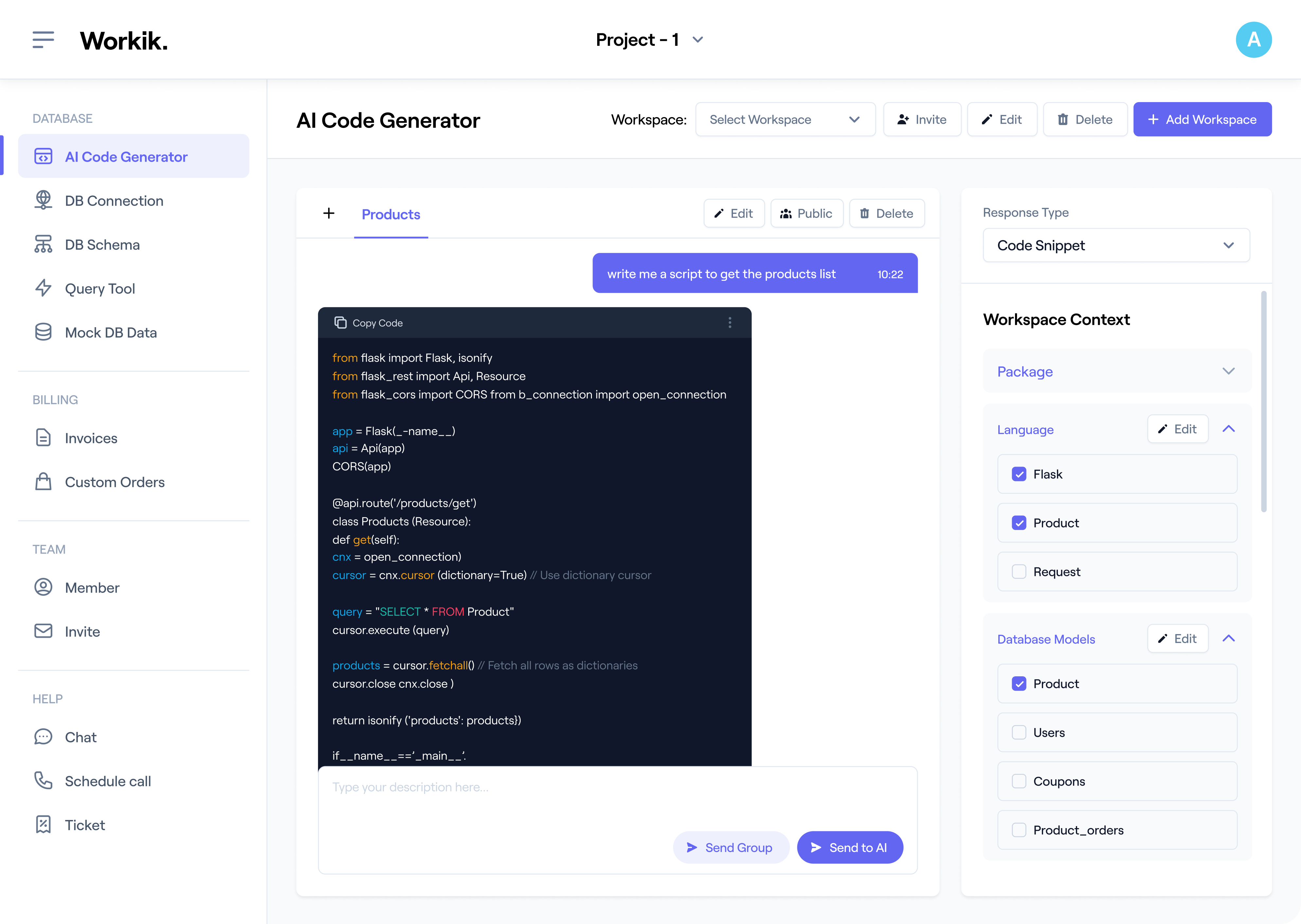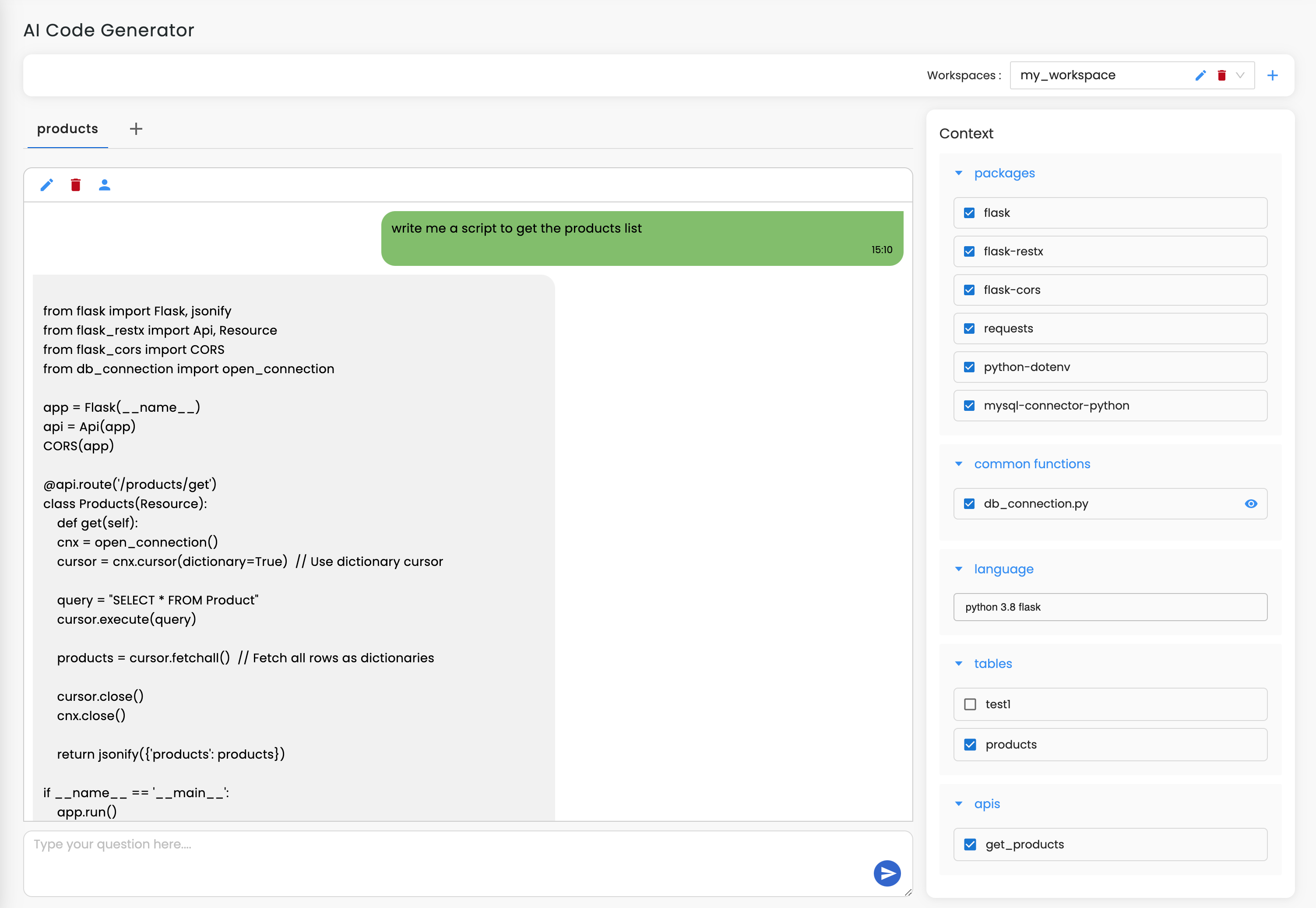Join our community to see how developers are using Workik AI everyday.
Supported AI models on Workik
GPT 5.2, GPT 5.1 Codex, GPT 5.1, GPT 5 Mini, GPT 5, GPT 4.1 Mini
Gemini 3 Flash, Gemini 3 Pro, Gemini 2.5 Pro, Gemini 2.5 Flash
Claude 4.5 Sonnet, Claude 4.5 Haiku, Claude 4 Sonnet, Claude 3.5 Haiku
Deepseek Reasoner, Deepseek Chat, Deepseek R1(High)
Grok 4.1 Fast, Grok 4, Grok Code Fast 1
Models availability might vary based on your plan on Workik
Features

Generate Jenkinsfiles Instantly
AI generates declarative or scripted Jenkinsfiles for Docker, Maven, and blockchain workflows in seconds.

Structure CI/CD Logic
AI builds full Jenkins pipelines with parallel stages, rollbacks, and integrations like GitHub, Helm & more.

Resolve Pipeline Breaks
Identify failed stages, plugin issues, or smart contract errors fast with AI-powered troubleshooting.

Document Jenkins Pipelines
Use AI to create clean docs for stages, shared libs, and credentials—ideal for audits and decentralized CI workflows.
How it works
Register with Google or manually enter your details to access AI-powered Jenkins pipeline generation tools.
Connect your GitHub, GitLab, or Bitbucket repositories. Add Jenkinsfile references, Dockerfiles, Groovy scripts, or tools like Maven, Gradle, and Ansible to guide AI accurately.
Let AI generate Jenkinsfiles, configure parallel stages, debug failed jobs, optimize builds, and integrate with Docker, Kubernetes, Helm, and more.
Invite your team to review Jenkins pipelines, refine stages collaboratively, and use AI to troubleshoot issues or boost performance.


Expand
.png)
.png)
Expand


Expand


Expand


Expand


Expand


Expand


TESTIMONIALS
Real Stories, Real Results with Workik
Workik AI streamlined our Jenkins pipeline setup. It reduced config time and improved our deployment flow across Docker environments.

Serena Rodger
Senior DevOps Engineer
As someone new to Jenkins, AI made pipeline creation simple. I deployed from GitHub to staging in minutes.

Ian Brooks
Junior Backend Developer
Workik AI helped us integrate test stages seamlessly into Jenkins. Debugging failures is now fast and reliable.

Alina Kovacs
QA Automation Architect
What are popular use cases of Workik AI-powered Jenkins Code Generator?


* Generate Jenkinsfiles automatically for CI/CD pipeline creation.
* Set up multi-stage pipelines with build, test, deploy, and rollback stages.
* Configure Docker-based Jenkins agents and integrate with Kubernetes clusters.
* Define parallel stages and post-build actions for efficient execution.
* Use AI to debug failed jobs, optimize build steps, and manage environment variables dynamically.
* Automate plugin configurations for tools like SonarQube, Artifactory, or Slack notifications.
What kind of contexts can I add to Workik’s AI for Jenkins Code Generator?


Workik offers powerful context-setting options to tailor Jenkins code generation, such as:
* Link GitHub, GitLab, or Bitbucket repositories to auto-trigger Jenkins jobs.
* Add Groovy or scripted pipeline snippets to guide AI in custom job logic.
* Include Dockerfiles, Helm charts, or Kubernetes manifests for container orchestration.
* Define tools like Maven, Gradle, Ansible, or Terraform for end-to-end automation.
* Import environment variables, credentials, and config files for multi-env pipelines.
* Upload existing Jenkinsfiles or shared library structures to standardize workflows.
Can AI reduce plugin mismanagement or outdated configurations in Jenkins?


Yes, plugin sprawl is a hidden pain in Jenkins environments. Workik AI keeps your pipeline scripts clean by recommending lean plugin stacks for the job. If you’re managing test coverage with Jacoco and code scans with SonarQube, AI ensures plugin versions align with your Jenkins core, and even suggests replacements for deprecated ones.
Can Workik AI help teams running blockchain-based applications with Jenkins?


Definitely. Blockchain pipelines often require smart contract compilation, testnet deployment, and live verification steps. AI can set up these Jenkins pipelines with Truffle tests, Solidity compiler stages, IPFS uploads, and deployment triggers to Ethereum testnets — all inside a modular, versioned Jenkinsfile.
Does AI help with secret and credential handling?


AI sets up secure credential bindings using Jenkins Credentials Plugin and environment variables, ideal for working with AWS keys, DockerHub tokens, or Git secrets.
What if I want to integrate SonarQube or Artifactory?


Just include it in your context. AI configures SonarQube scanners or artifact uploads to JFrog with proper stages and plugin setup.
Is AI useful for handling Jenkins agents and labels?


Yes. AI can assign specific labels to job stages, manage node allocation, and configure Docker or Kubernetes agents for optimized execution.
What about multi-branch pipeline setup?


AI supports multi-branch pipeline jobs by auto-generating Jenkinsfiles that adapt to branch-specific workflows, ideal for GitHub PR flows or staging/production toggles.
Can’t find the answer you are looking for?
Request question

Generate Code For Free

JENKINS: Question & Answer
Jenkins is an open-source automation server used to build, test, and deploy code. It enables Continuous Integration (CI) and Continuous Delivery (CD) by automating repetitive development tasks through customizable pipelines written in Jenkinsfile. Jenkins supports both declarative and scripted pipeline formats, allowing developers to define complex workflows and integrate with virtually any tool in the DevOps ecosystem.
Jenkins integrates with a wide range of tools and technologies, making it highly flexible for any CI/CD setup:
Programming Languages:
Java, Python, Node.js, Go, Ruby, C#.
Build Tools:
Maven, Gradle, Ant, Make.
Containerization & Orchestration:
Docker, Kubernetes, Podman, Helm.
Testing Frameworks:
JUnit, TestNG, PyTest, Cypress, Selenium.
Infrastructure as Code:
Terraform, Ansible, AWS CloudFormation.
Monitoring & Alerts:
Prometheus, Grafana, Datadog, Slack notifications.
Security & Code Quality:
SonarQube, Checkmarx, Snyk, OWASP ZAP.
SCM & Version Control:
GitHub, GitLab, Bitbucket, SVN.
Jenkins is used across a wide range of development and DevOps scenarios, which includes but is not limited to:
CI/CD Pipelines:
Automate builds, tests, and deployments across environments.
Microservices Deployment:
Build and deploy multiple services in parallel using matrix jobs.
Multi-Environment Releases:
Promote builds through staging, QA, and production environments with approval gates.
Container Workflows:
Automate Docker builds, image tagging, and push to registries, followed by Kubernetes deployment.
Infrastructure Automation:
Trigger Terraform or Ansible scripts post-build for dynamic provisioning.
Security Scans:
Run static and dynamic analysis on every commit using tools like SonarQube or Snyk.
Monitoring Integration:
Send build statuses and failure alerts to Slack or Grafana dashboards.
Jenkins skills open doors to roles like DevOps Engineer, Jenkins Pipeline Developer, CI/CD Engineer, SRE, Platform Engineer, Cloud Infra Engineer, and QA Automation Specialist.
Workik AI enhances Jenkins usage by automating and optimizing the CI/CD lifecycle:
Pipeline Generation:
Instantly generates Jenkinsfiles with build, test, deploy, and rollback logic.
Debug Assistance:
Identifies failed stages, missing dependencies, or plugin conflicts and suggests targeted fixes.
Refactoring:
Cleans up outdated Jenkinsfiles and converts scripted pipelines to declarative format.
Pipeline Optimization:
Streamlines stages, reduces build time, and manages parallel execution efficiently.
Pipeline Documentation:
Auto-documents your Jenkinsfiles, plugin usage, and pipeline flow for easy team handoff.
Secure Credentials Handling:
Configures encrypted credentials and secrets using Jenkins’ Credentials Plugin.
Multi-Env Support:
Creates pipelines that support staging, QA, and production flows with environment-specific configurations.
Explore more on Workik
Top Blogs on Workik
Get in touch
Don't miss any updates of our product.
© Workik Inc. 2026 All rights reserved.

